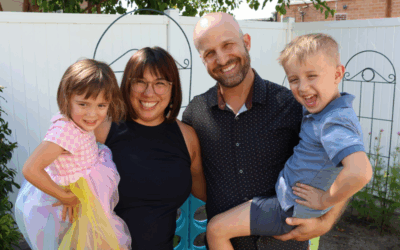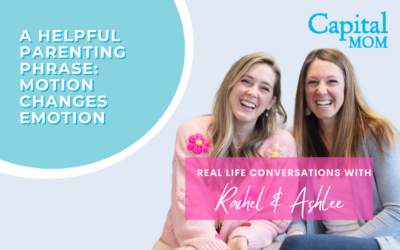I was scrolling through my photos the other day and noticed how few include me with my kids. I have plenty of adorable snapshots of my two children and tons of great shots of my husband with them, both candid and posed. I genuinely love taking photos on my phone or...
Pregnancy & Babies
The birth of your baby is one of the most exciting times in your life. From the happiness of finding out you’re pregnant, to the pure joy you experience holding your baby for the first time; we’re here to provide you with helpful information and resources every step of the way.
Recent Posts About Pregnancy & Babies
My Inner Voice: The Power of Positive Self-Talk
I’ve never been one to ask myself the “why me” question when something doesn’t go as planned in my life. Thankfully, when times have been difficult I’ve been able to skip past this question and look for solutions by asking “what if”. Often, when life presents a...
Appreciating the Mess
Welcome to Real Mom Moments with Rachel and Ashlee. More Real Mom Moments Raise Your Hand If... Skills of Independent Play I am a mom to three awesome kids: Ellie, Anna, and Levi. My husband Jon works as a professor at the UNL Business College. While we are not...
How to Deal With Big Changes in Your Life
The one constant in life is change. One might get a new job, have a baby, graduate or move to a different city. Even though changes can be exciting, they can also be stressful. My patients frequently ask for coping strategies to deal with the big changes in life. Here...
This Summer, Don’t Just Survive the Family Vacation, Enjoy It
Does the thought of a summer vacation kind of stress you out? Do you ever come back from a “getaway” feeling more drained than when you left? Same. Traveling with little humans is a full-contact sport. As the mom, I’m not just packing the snacks and sunscreen, I’m...
My Grandparenting Style: Simple, Spontaneous and Surprising
My daughter-in-law was sorting through cards and letters that their family had received over the past five years and sent me a picture of a card she thought I might enjoy. Upon receiving, my first thought was, “Wow, cheers to Emily! She’s tackling this after five...
Helping Our Kids Understand Their Worth: Who They Are Not What They Do
Welcome to the CapitalMOM Real Life Conversation. Today, we're going to jump into a topic that has really been on both of our hearts, and it is making sure that our kids know that their worth is based on who they are and not what they do. So we'll jump into that just...
Safe Sleep Practices for Newborns
Welcoming a baby into the world is a happy and exciting time! One of the most important aspects of caring for a baby is ensuring safe sleep. Infants typically sleep 16 to 18 hours a day, which is essential for their growth, development and overall health. Safe sleep...
Could an Ongoing Cough or Chest Cold Be Asthma?
I often see patients in my office who are dealing with a cough or chest cold that won’t go away or returns repeatedly. With these symptoms, I consider if my patient might have asthma.
Moms Just Wanna Have Fun: Prioritizing Your Own Joy This Summer
The last day of school is on the horizon, and the kids are already buzzing with excitement for summer. As I brainstormed what to write about for May, a few obvious topics came to mind: summer activity bucket lists, spring cleaning and toy purging, summer survival...
Retirement: One Word, So Many Reactions
Retirement. I never really thought too much about the word or the idea of retiring. I truly enjoyed and appreciated the work I was asked to perform at Bryan. It felt challenging, purposeful and fulfilling. I loved my co-workers and volunteers - they were like family...
A Helpful Parenting Phrase: Motion Changes Emotion
Welcome to the CapitalMOM Real Life Conversation. Today, we're going to talk about one phrase that actually helps in the moment. So, there are lots of phrases that we can hear sometimes - this one is motion changes emotion. We're going to do our little glimmers...
Childbirth & Parenting Classes
We’re here to help you and your family prepare, not only for the birth but also for life after baby. Bryan offers a range of classes and events for expecting parents and family members.
Find a Doctor for Baby & You
Whether you’re pregnant or thinking about it, one of your first big decisions is choosing a doctor. Another important decision is choosing a doctor for your baby; you will want to do this before your baby is born.
Tour the Bryan Family Birthplace
Sign up for our pregnancy newsletter!
Hospital Packing List
Be prepared for your big day with our hospital bag packing list for you, your baby and support person.
Preregister Your Birth
Tour the Bryan Family Birthplace













